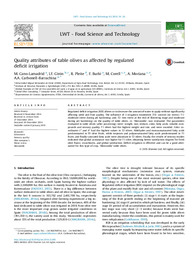Título :
Quality attributes of table olives as affected by regulated deficit irrigation |
Autor :
Cano-Lamadrid, Marina
Girón, Ignacio Francisco
Pleite, Rafael
Burló, Francisco 
Corell González, Mireia 
Moriana-Elvira, Alfonso
Carbonell-Barrachina, Ángel A. |
Editor :
Elsevier |
Departamento:
Departamentos de la UMH::Tecnología Agroalimentaria |
Fecha de publicación:
2015-06 |
URI :
https://hdl.handle.net/11000/34321 |
Resumen :
Regulated deficit irrigation (RDI) allows us to decrease the amount of water to apply without significantly
affecting yield and fruit quality. The influence of 3 irrigation treatments [T0: control (no stress); T1:
moderate stress during pit hardening; and, T2: low stress at the end of flowering stage and moderate
during pit hardening) on the quality of table olives, cv. ‘Manzanilla’, was evaluated. The parameters
evaluated in table olives (after processing) were: weight, size, texture, color, fatty acids, volatile compounds and sensory quality. T1 olives had the highest weight and size, and were rounded. Color coordinates L* and b* had the highest values in T2 olives. Aldehydes and monounsaturated fatty acids
predominated in T0 olive fruits, while terpenes and polyunsaturated fatty acids predominated in T1
fruits, and finally saturated fatty acids were abundant in T2 olives. Finally, the results of sensory studies
indicated that global acceptance was higher for T1 olive, obtaining better satisfaction degrees for fresh
olive flavor, crunchiness, and global satisfaction. Deficit irrigation is effective and can be a good alternative for this type of crop, ‘Manzanilla’ table olives.
|
Palabras clave/Materias:
Consumers
Sensory quality
Olea europaea L
Water stress
Manzanilla |
Tipo de documento :
info:eu-repo/semantics/article |
Derechos de acceso:
info:eu-repo/semantics/openAccess
Attribution-NonCommercial-NoDerivatives 4.0 Internacional |
DOI :
http://dx.doi.org/10.1016/j.lwt.2014.12.063 |
Publicado en:
LWT - Food Science and Technology Volume 62, Issue 1, Part 1, June 2015, Pages 19-26 |
Aparece en las colecciones:
Artículos Tecnología Agroalimentaria
|
 La licencia se describe como: Atribución-NonComercial-NoDerivada 4.0 Internacional.
La licencia se describe como: Atribución-NonComercial-NoDerivada 4.0 Internacional.
.png)
